How to train a French Bulldog
Discover everything you need to know about training a French Bulldog
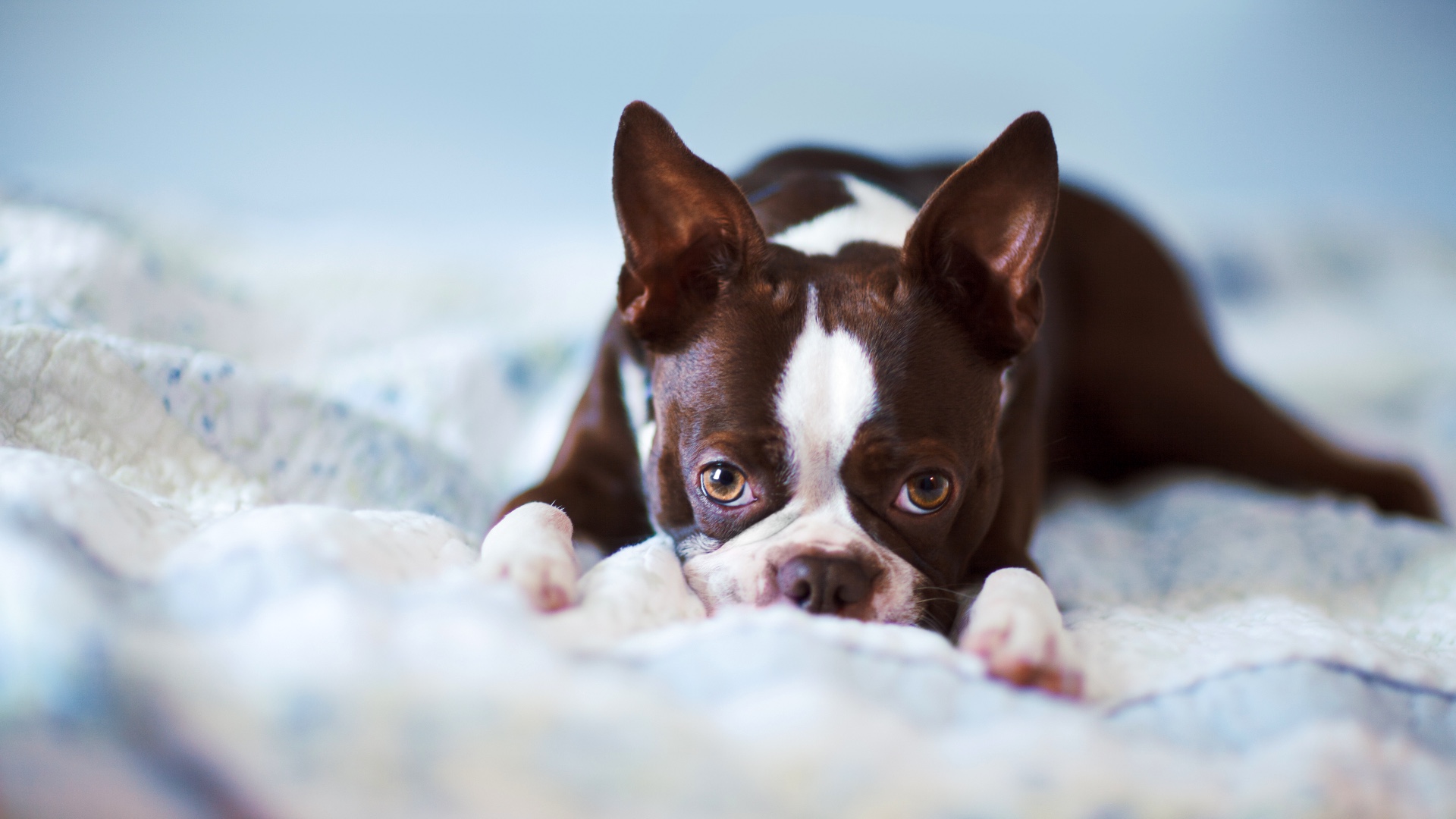
Just like with any dog, training a French Bulldog is all about consistency, patience and kindness. If you want to know how to train a French Bulldog, and nip a few of this breed's most common behavioral problems in the bud, our easy guide will show you how.
Frenchies, as they are affectionately known, can be relatively easy to train as they are intelligent, people-oriented dogs who love to please; however they can also be stubborn and strong-willed.
The key to teaching them good behavior is to start early. Training a French Bulldog puppy is all about using plenty of positive reinforcement and being consistent in your training method. If you do this, you’ll have a happy, well-behaved pet.
Are French Bulldogs easy to train?
French Bulldogs can be easy to train as they are smart dogs, but often teaching them proves to be challenging as they are sometimes quite obstinate. It’s important to be firm but patient with them. Train this breed using plenty of food and praise to reward them for learning a skill and be sure to be consistent in your training.
Tips for successfully training a French Bulldog
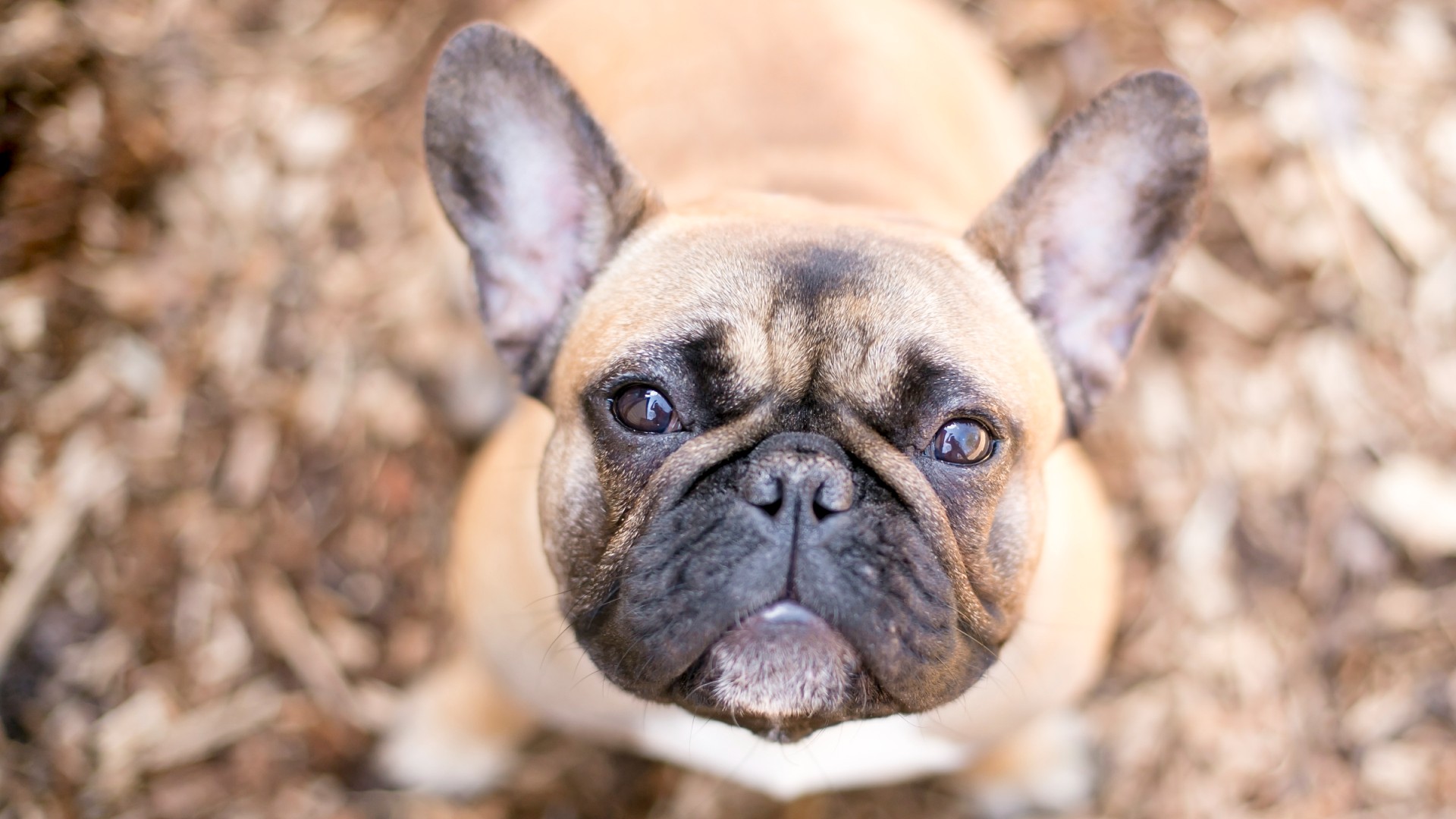
1. Create a training schedule
Training a French Bulldog will be easier if they have a routine set out for them. Choose a specific time during the day to train them (ideally not when they’re hungry or tired) and be consistent in your training method.
2. Start early
French Bulldog puppies can be trained from as young as eight weeks and the sooner you start training them, the easier it will be. Start with basic obedience training and simple commands such as “no”, “sit” and “come.”
3. Keep it short
Your pup will learn faster if you keep training fun. Stick to short training sessions of around five minutes a day so that your dog doesn’t lose focus or get bored. If they enjoy it they’ll be more keen to listen.
Get the best advice, tips and top tech for your beloved Pets
4. Don’t overexert them
It’s important not to put too much strain on your French Bulldog. They have short snouts and often suffer from breathing difficulties so they’ll need lots of water and breaks so they don’t get too tired and act out.
5. Praise and reward
The best way to train a Frenchie is by using positive reinforcement. Every time they obey a command, give them a small treat as a reward and praise them by saying “good dog.” This way they will associate listening to the command with a reward and continue to listen. It’s important to use small treats for training as the breed can gain weight easily.
You could also combine treats with healthier food by making a training trail mix or use a clicker to train them so you can eventually wean them off the treats once they have learned to obey commands when they hear the clicker.
6. Socialize your pup
As with all dogs, socializing your French Bulldog early is important as they need to understand how to live in the world around them without fear. Start by letting them explore your home and allowing them become part of the household and family. Make sure they are happy to travel in your car in the event that you need to take them to the vet.
Get them used to streets and busy areas, the sights and sounds of the neighborhood. Then take them to a dog park so they can meet other dogs and humans. Just make sure you keep them on a leash for their first interactions.
7. Know when to seek help
If you’ve got a particularly stubborn French Bulldog and are struggling to train them know that it’s ok to seek professional help.
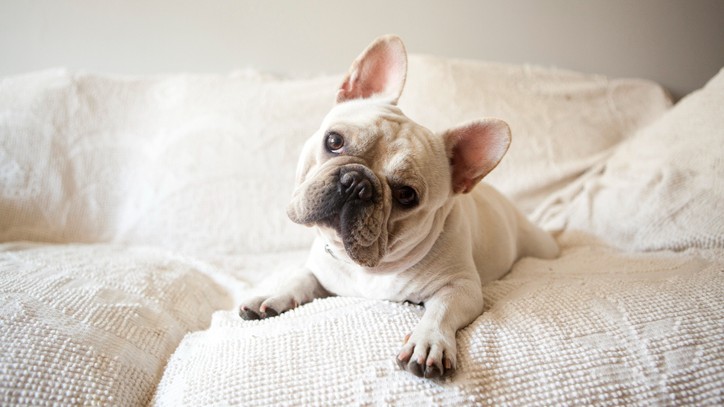
How to train a French Bulldog
To sit
French Bulldogs can be trained to sit using positive reinforcement. Hold out a treat and if they jump up turn away from them. Then hold out the treat again but above their nose forcing them to look up and their rear to touch the ground. Then say “sit” and give them a treat.
Repeat the process until they sit by themselves as they begin to understand that sitting will be rewarded. If you are struggling to get them to sit you can gently push their rear down to show them how.
To walk on a leash
You can train your French Bulldog to walk on a leash from around eight weeks. First introduce them to the collar and the leash so they are used to the equipment and are relaxed. Then gently place the collar on them praising them and giving them treats if they are happy to wear it.
Finally add the leash and again praise and give them treats if they come to you and are happy to be led with the leash.
Practise this inside first and, once the routine is established, try it outside, but make sure to choose your time wisely so not when they’re hungry or tired. Start with small walks and make your walks fun. Then just keep practising!
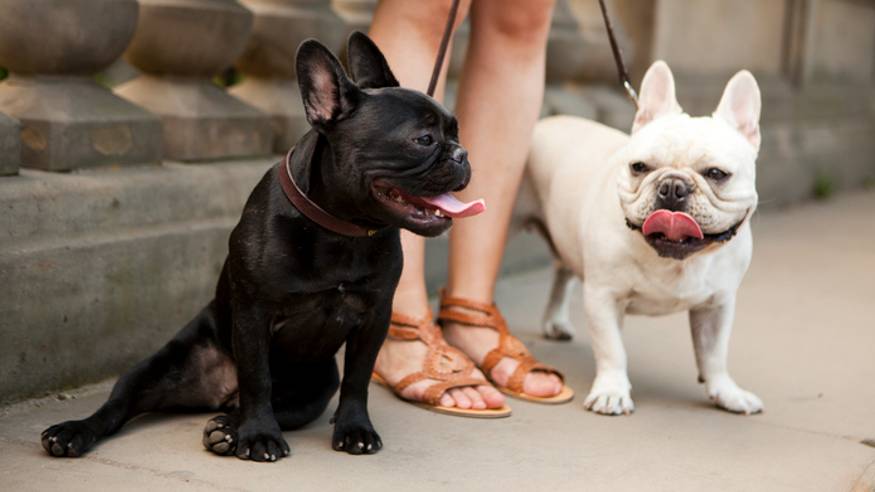
Tackling unwanted behaviors in French Bulldogs
Biting
French Bulldogs are not an aggressive breed and they aren’t known for biting; however puppies may nip at you when they’re playing or teething. It’s important to teach them not to bite early on so that it doesn’t become more serious as they grow up.
Socializing your dog early on will help prevent them from biting as they’ll be more used to other dogs and people as well as loud noises and foreign environments.
1. Exert dominance
It’s important to exert dominant behavior so that your pet knows you’re in charge. Use a stern voice, but never hit them for biting. If your French Bulldog pup bites you try to place your thumb under their tongue and your finger under their chin for 10 seconds and say “no”.
If this doesn’t work you could try wearing gloves with a bitter substance on them so that they associate biting with a bad taste in their mouth. It’s important to train your dog not to bite you when your hands are near their mouths so that when they need it you can check their mouth or administer medicine.
2. Avoid rough play
You may be tempted to “rough play” with your pup if they bite you and it doesn’t hurt, but it’s important not to continue play if they bite you so they understand not to bite. You could also try yelping like a puppy. When puppies play and one of them bites the other, they tend to cry out. If you mimic this behavior your pup will know it’s hurt you and back off.
Ensure you are giving them other options, such as good quality dog chew toys, to teach them it’s ok to chew their toys, but not to bite you.
Not listening
The key to disciplining a puppy is understanding that discipline is not about yelling, hitting or punishing your dog. Instead, use positive reinforcement to train them to be good and not bad. In order to discipline your pooch you need to be consistent with your training.
Don’t train them to not jump up on you one moment and then let them jump up on you when you’re happy to see them the next as this sends them mixed messages. It’s also important to discipline them at the time they are bad.
There’s no point shouting at a dog for chewing your bag hours after the incident as they won’t understand why they’re being shouted at. Remember not to shout, but instead use a firm voice and dominant body language.
When they behave badly try turning your back on them or leaving the room so that they know bad behavior won’t get them attention.
If this doesn’t work try distraction. If they’re chewing something they shouldn’t, give them something they can chew on to distract them.
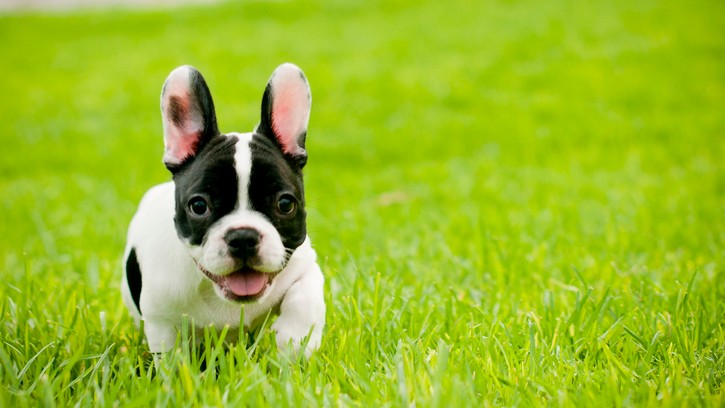
Crate training your French Bulldog puppy
Crate training your puppy will not only help you house train them, but it’ll make all your training easier as it helps establish boundaries.
Make sure you research the crate you buy and that it is big enough for your pup to stand up comfortably, turn around and lie down in it. Place it somewhere in the house that’s not too central to family life and commotion, but not too isolated either. Introduce them to the crate slowly by leaving the door open. Put treats or feed them meals inside the crate so that they feel happy to explore it.
Establish a routine for when your dog goes inside their crate and slowly get them to spend longer and longer inside it so that they are happy to be in it at night or when you are out. However, remember not to leave your dog in their crate for too long and never use it as a form of punishment as you don’t want them to associate the crate with fear.
Potty training a French Bulldog
When it comes to potty training your dog, the earlier you start the better as this way they won’t develop bad habits. French Bulldogs can be potty trained from eight weeks onwards so start as soon as you can.
If you want them to relieve themselves outdoors don’t let them get used to going inside. Start training them to go outside straight away.
1. Create a routine
To potty train your dog you’ll need to know how long they can hold it for. As a general rule it’s their age in months plus one hour so, for example, a one-month-old puppy will usually be able to hold it for two hours. Use this information to plan a routine for your pup’s meals, walks and play times. Then slot in when to take them out to “go potty” around these times.
If your French Bulldog needs to go, they’ll generally start showing certain behaviors ahead of time. This could be pacing up and down, whining, barking or staring. Watch out for these cues so you can take them out quickly and help them avoid accidents.
Limit their area in the house while they are potty training and slowly give them more and more room in the house to roam as they become potty trained.
2. Reward and praise
When your dog needs to go, go outside with him to make sure they have done their business and then reward them for going and praise them. As with all training, be consistent. Repeat the same methods so, for example, always say “go potty” when you take them out to go and reward them by repeating “good dog”.
3. Don't raise your voice
If your pup has an accident indoors make sure you don’t hit or shout at them, but do clean up immediately so that there is no scent and your dog doesn’t return to the spot to go again. Be sure to check in with your vet if your pup is having one too many accidents as it could be a sign of a underlying health condition.
Want to learn more about this breed? Here are our favorite French Bulldog facts

